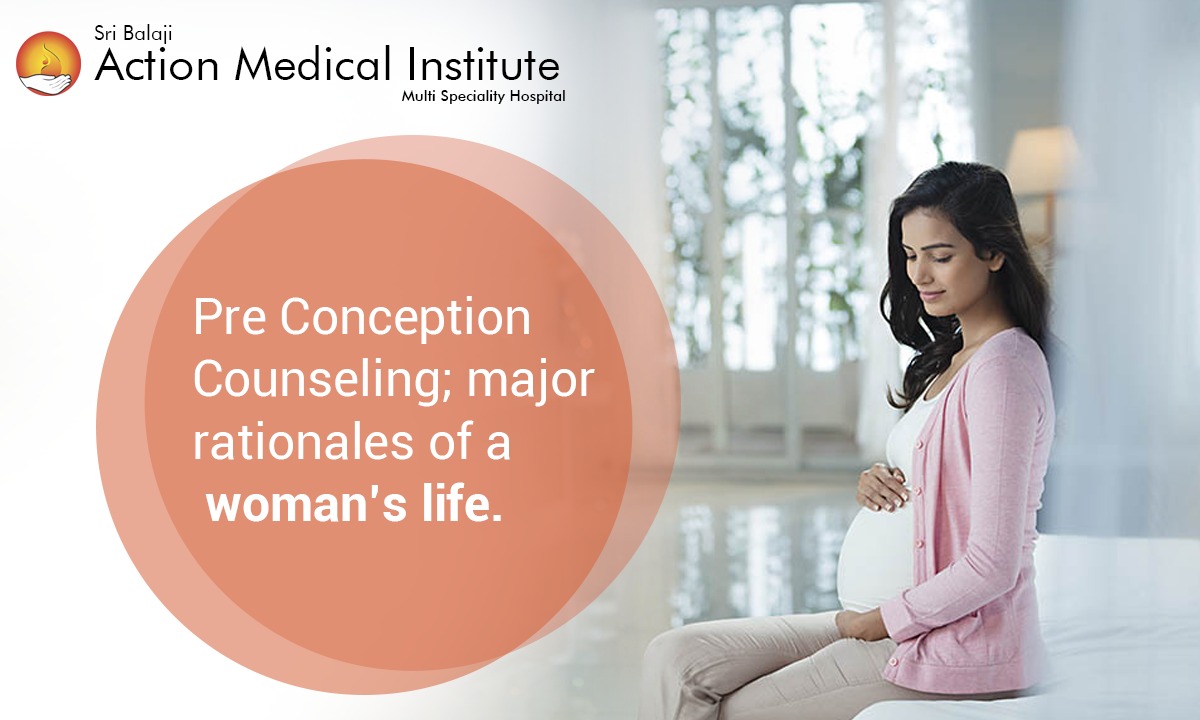Pre Conception Counseling; major rationales of a woman’s life.
Pre Conception Counselling (PCC)
Pregnancy is one of the major rationales of a woman’s life. But these days due to unhealthy diet plans and consumption patterns especially junk food has completely transformed our bodies and has made it more vulnerable to diseases, also deteriorating our body’s capacity to assimilate vital nutrients and adding harmful nutrients to our body due to which problems of non-conception and infertility arises in males as well as females.
Preconception counseling is a meeting with a healthcare professional (generally an obstetrician) by a woman before attempting pregnancy and should start counseling 3 to 6 months before trying. A woman needs to plan conception rather than being an accident. So here PCC plays its role in assisting the woman to fully understand whether she is even ready for pregnancy or not, what shall be the right time according to her health status, potential risks are exposed if any by your doctor and your mind is attuned to the thought of pregnancy in-depth ensuring that you have the right knowledge about it so you are able to decide the best for yourself and for the baby you will be producing in future. PCC should be considered an integral part of primary care for women of reproductive age it includes family planning, achieving a healthy body weight, screening, and treatment. PCC is routine in western countries, they are still at the infancy stage in India. Early antenatal care is too late to prevent birth defects.
The objective of PCC is to ensure, that the woman is as healthy as possible before conception to promote her health and the health of her future children. The woman should herself be apprised of such counseling and go for it before it is too tardy because, in the end, it is you and your body that will be exposed to afflictions.
THE CLINICAL RECOMMENDATIONS:
Here is what you can expect in your first appointment:
The doctor will get you through some tests and physical checkup that will detect if you are exposed to STDs, he will bindingly ask you about your family reproduction history, diseases that potentially run in your family, get you lower abdomen tested to confirm that your uterus and ovaries are healthy. PCC given by your doctor will give you a piece of complete knowledge about yourself and deficiencies will be taken care of beforehand. So here are some of the observations your doctor will make to ensure
● Get some information about their expectation to get pregnant. Give contraceptive guidance
● PRENATAL VITAMINS – The obstetrician will recommend you to start taking folic acid supplementation (400 mcg every day) to decrease the danger of neural tube defects.
● Weight management – Survey weight files and guide ladies who are overweight, obese, or underweight about accomplishing a healthy body weight before getting pregnant. Nutritional consideration Weight < 85% or > 135% of the ideal for the height.
● PRE-EXISTING DISEASES – Advice women with diabetes mellitus about the significance of glycemic control before conception as it decreases the risk of congenital anomalies.
● TERATOGENIC MEDICATIONS – Check for utilization of teratogenic medication. Teratogens hamper the growth of the fetus or cause abnormal growth.
● TESTS AND EXAMINATIONS – Screen patients who wish to get pregnant; for STDs and other communicable infections as demonstrated.
Update hepatitis B; flu; measles, mumps, rubella; Tdap; and varicella vaccinations on a case by case basis in patients who wish to get pregnant.
● ANAEMIC DISORDERS -Screen for anemia, provide adequate supplementation to correct it
● WORKPLACE SAFETY -Evaluate the work environment and household exposure to toxic chemicals such as lead, mercury. Check exposure to X-rays and other harmful radiations for the baby.
● REDUCE FISH CONSUMPTION: Insight patients about dodging exposure by not consuming enormous fish (e.g., shark, swordfish, tilefish, lord mackerel) and restricting other fish consumption.
● GENETIC COUNSELING – Refer couples for genetic counseling when there is a family history of congenital anomalies or genetic disorders.
● For women with chronic diseases switch to the fewest and lowest possible dose of medication. Assess for depression and anxiety disorder and treat them before conception.
● Assess for domestic violence and inquire about substance use such as alcohol, chewing tobacco, smoking, or illicit drug abuse.
● Provide them with behavioral and medical treatment to avoid substance abuse shortly.
● Screen women against infections like diseases like chlamydia, gonorrhea, herpes simplex virus, HIV (human immunodeficiency virus), syphilis, tuberculosis, etc.
● Vaccinate all high-risk women against hepatitis B, influenza.
● Screen for immunity against varicella, rubella, and vaccine all non-immune patients and counsel patients to avoid pregnancy for 3 months after vaccinations.
As the incidence of obesity is increasing the patients are going for bariatric surgeries, they should be counseled to prevent pregnancy for 12 to 18 months after surgery and optimize their nutritional status by providing them with supplements.
There are certain chronic medical conditions to be taken care of and should be strictly avoided :
• Acne – use of isotretinoin should be avoided
• Asthma – inhaled corticosteroids and beta-agonists are preferred.
• Diabetes Mellitus – most oral antidiabetic agents should be discontinued and insulin should be started.
• Hypertension – safe antihypertensive drugs should be given.
• Hyperthyroidism – PTU (prop lie thyroid uracil) is preferred in the first trimester, methimazole is preferred in the second and third trimester.
• Seizure Disorder – Monotherapy should be used at the lowest effective dose.
• Thrombophilia – heparin or low molecular weight heparins preferred.
• Hypothyroidism – adequate control should be achieved before pregnancy.
Why preconception care for men is important?
PCC is not only about women, men need it too. It prepares men for fatherhood, offers them an opportunity for disease prevention and promotion of their health, and also gears them up about the responsibilities they are about to get into. PCC is a part of preventive medicines and needs to be proactive.





